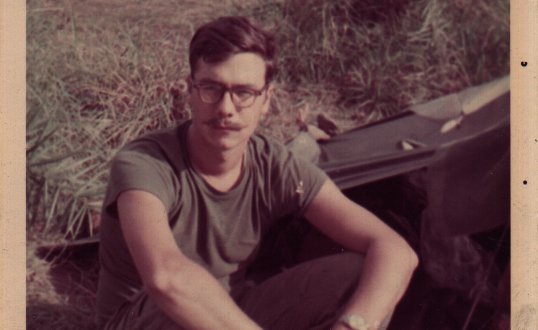Board Member of the Month: Dr. Richard Lauf

At the age of 14, a young boy read the Chicago Tribune and was inspired to attend a speaker series with the French Ambassador. “I bussed down to the Chicago Historical Society, men were dressed professionally in suit and tie, women elegantly dressed, and a tres elegant French ambassador gave the talk. Here I am 14 years old dressed like any other high school student, but all were welcoming,” said now Board Chair of the World Affairs Council of Cincinnati and Northern Kentucky, Dr. Rich Lauf. “The French Ambassador was suave and oozed continental charm while he gave the views of the French government on a variety of issues. It was the most fascinating evening I had ever had.”
Lauf was born and raised in Chicago, Illinois. He attended Lane Tech College Prep, an all boy high school. He recalls his community as nationally diverse, most people originating from Eastern Europe, Hungary, Poland and Russia. Many classmates were children of refugees. “After 1959 Cuban Refugees also started settling in Chicago.” As he worked his way through college, he worked with people who survived Nazi concentration camps and Stalin’s Gulag. “World affairs became much more than just reading history books,” he observes.
From 1970 to 1971, Lauf joined the Army as an infantry platoon leader. He refers to this period as the longest years of his life. “When you experience war first hand, you gain a real appreciation for diplomacy,” said Lauf as he recalled his experience in the Vietnam War. He was awarded the Combat Infantry Badge and the Purple Heart during his service there.
After returning to the States, Lauf moved to the corporate world. He started a career with Procter & Gamble in Green Bay, Wisconsin. He later served as an internal consultant where he worked with international subsidiaries. Through this experience, he was able to visit and improve planning efforts to cope with the hyperinflation in Venezuela, to deal with the economic crisis in Mexico, and to plan for the opening European borders by the Schengen Agreement.
When Lauf moved to Cincinnati in 1983, he joined the World Affairs Council of Cincinnati and Northern Kentucky, then known as the World Affairs Council of Cincinnati. Lauf has seen many changes occur within the Council as he transitioned from a council member to a board member to the Board Chair. “The world has changed. Information that was not accessible then is now easily accessible. News sources like NBC and CBS only offered nightly news with limited differences, offering the same amount of time for global affairs. Now, we have 24/7 news from many outlets, covering many topics. We can bring deeper engagement for our members.”
Through the Council’s education programs, Lauf has seen a growth in capacity and outreach. “We have an enormous opportunity to affect students from K-12 and university. We can broaden, expand and reach out to more schools, classes, and students.”
Lauf has hope for the Council and their education programs. “As adults, we lose sight of what we wanted as young people. My first exposure as a 14 year old, had a 50-year effect on me. We need to create a similar impact for today’s students, like the change in me those many years ago.”
Outside of the Council, Lauf is a Board Member for the Cincinnati Opera. His love for the opera is showcased all over his office, with framed images from various operas held in Cincinnati, New York City, and San Francisco. Lauf looks forward to the coming opera season with The Flying Dutchman, a German-language opera by Richard Wagner. “When you are with the opera, you hear singers and musicians from all over the world,” said Lauf.
Lauf and his wife often travel to New York City, Chicago, and San Francisco to see operas, visit museums, and spend time with family. They have traveled out of the country to fulfill their love of history and art by visiting historical and culturally inclined cities like London, Paris, and Vienna.
As an invested member of this community, Dr. Richard Lauf has a true passion for international work, diverse cultures, and exploration. “I often think of the future of the young people, the future of my nieces. I never forget the 58,000 soldiers lost in the Vietnam War. I want better for the next generation. International understanding and readiness will make a huge difference.”


